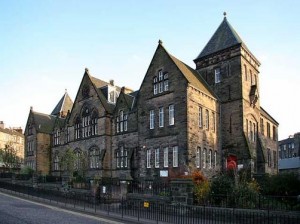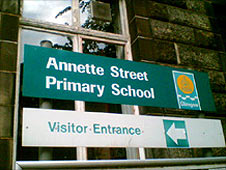
 As the Gathered Together project comes to an end we have been trying to capture all the good practice we’ve heard about. Yesterday we managed to meet with Karen Hartnup from Leith Walk Primary Parent Council in Edinburgh over a coffee to hear more about the book project they had run.
As the Gathered Together project comes to an end we have been trying to capture all the good practice we’ve heard about. Yesterday we managed to meet with Karen Hartnup from Leith Walk Primary Parent Council in Edinburgh over a coffee to hear more about the book project they had run.
Leith Walk Primary is a very diverse school- there were 41 different languages at the time that the Parent Council ran the book project in 2015 including Polish, Hindi, Urdu, Punjabi, Spanish, Portuguese, Arabic and Mandarin. Many of the parents in the school wanted their children to keep using the home language but found it difficult to find books in their own language, particularly for older children. Leith Walk Primary Parent Council felt that this was an opportunity for them to engage with the diverse parents and support them to be able to help their children’s learning.
The area of Leith has an event called £eith decides, where people who live and work in the local community have the opportunity to decide how a pot of money should be spent. All the organisations who are applying for funding let the local people know what their plan is and anyone aged 8 or older can vote for their favourite project. To get as many votes for the book project as possible, the Parent Council created multilingual posters with the word “book” written in all the languages of the school; they also went out into the playground and spoke to parents- letting parents who spoke English as an additional language know that their home language was respected at the school. The campaign was successful and the Parent Council got £1,000 from £eith decides.
 After securing the funding, the Parent Council started consulting with parents about what books to buy- parents shared favourite stories from their childhood, suggested things that their children were interested in and were able to let the Parent Council know if a translation was actually any good. It was an empowering experience where the EM parents were the experts and they could see the PC responding to their suggestions. Accessing books in other languages is often difficult- postage and packing cost twice as much as the books themselves and some of the books parents suggested from their own childhood were simply out of print. To help in accessing the books, the Parent Council teamed up with the local library and Bilingualism Matters. The books were put on display at the MacDonald road library near the school for parents to come along and see the books (and let the Parent Council know if they were good versions) and the community learning and development team promoted the event to the families they were working with.
After securing the funding, the Parent Council started consulting with parents about what books to buy- parents shared favourite stories from their childhood, suggested things that their children were interested in and were able to let the Parent Council know if a translation was actually any good. It was an empowering experience where the EM parents were the experts and they could see the PC responding to their suggestions. Accessing books in other languages is often difficult- postage and packing cost twice as much as the books themselves and some of the books parents suggested from their own childhood were simply out of print. To help in accessing the books, the Parent Council teamed up with the local library and Bilingualism Matters. The books were put on display at the MacDonald road library near the school for parents to come along and see the books (and let the Parent Council know if they were good versions) and the community learning and development team promoted the event to the families they were working with.
Leith Walk Primary has a regular Friday bake-sale. At one of these the Parent Council showed the new books to give parents the opportunity to see the resources that were available and how their suggestions had been acted on. One of the most common questions from seeing the books was “where can we buy these?”, so the Parent Council approached a local bookshop and suggested they stock children’s books in the languages spoken in the community. The bookshop will have a stall at the school’s multi-cultural fair later in the year, giving parents the chance to buy books for themselves.
Leith Walk Primary now has a growing multi-lingual library, it’s in regular use and one Spanish parent spoke about her joy the first day her daughter brought back a book in Spanish so they could read it together. It’s made the local library realise they need to make it easier for families to find books in their own language and they are creating online lists of all the books they have in particular languages. For Karen, the book project has given her a lot of new friends- the parents who gave her advice and ideas for books to source. The parents who are new to Scotland were really excited by the project and it showed them that their culture and language is valued and a part of the school. In the feedback one parent said
Thank you for … your BIG work on finding bilingual books for kids in our school- it is really important for them to have the storybook on their mother language.
 Today we were invited to the world premier of “Our children’s future- learning in Glasgow” at Annette Street School in Govanhill. The schools and nursery in Govanhill (Annette Street, St Brides, Cuthbertson, Holy Cross and Govanhill nursery) had been working together to make a short film for new parents, explaining, in their own words the important information about schools in Scotland. It was generously funded by Eurocities and the Scottish Traveller Education Programme, particularly to help the Roma population in the area. Govanhill has always been a diverse area with families from Ireland, Pakistan, Poland, Slovakia and Romania making their homes here. Parents who are new to Scotland are often unaware of the differences between here and their home country- the right to get a place in nursery for 3-4 year olds, the fact that primary school education starts when children are 5 and what children should bring for gym class.
Today we were invited to the world premier of “Our children’s future- learning in Glasgow” at Annette Street School in Govanhill. The schools and nursery in Govanhill (Annette Street, St Brides, Cuthbertson, Holy Cross and Govanhill nursery) had been working together to make a short film for new parents, explaining, in their own words the important information about schools in Scotland. It was generously funded by Eurocities and the Scottish Traveller Education Programme, particularly to help the Roma population in the area. Govanhill has always been a diverse area with families from Ireland, Pakistan, Poland, Slovakia and Romania making their homes here. Parents who are new to Scotland are often unaware of the differences between here and their home country- the right to get a place in nursery for 3-4 year olds, the fact that primary school education starts when children are 5 and what children should bring for gym class.
All this information, and more, was covered in the film- but more importantly it was given by parents who have already gone through the system and were talking in their mother tongue. Hearing from another mother in your language what happens in school is far more reassuring and easy to understand- hearing it from the “horse’s mouth”. The film also had children from the schools talking about what happens in school- from showing off the “bug hotel” in the school play ground to demonstrating what to wear for gym class.
It was a real pleasure to attend, all the film stars looked so pleased and a real effort was made to make the event special- red carpet, bouquets of flowers for the mothers who appeared in the film and huge slices of cake served after the premier. Events like this help families feel a part of the school, giving a sense of belonging and the film has a far more lasting legacy- helping new families understand their children’ school.
You can see the film on the STEP website here
We just spent an afternoon at St Albert’s Primary school in Glasgow with their bilingual story-telling group. These are parents who are being trained to read stories in English and their mother tongue (Urdu) to children. St Albert’s has a huge ethnic minority population with most children coming from Pakistani and Asian families where both English and Urdu are spoken in the home.
When we met the group several of the parents spoke about their children not valuing Urdu and believing that English was “better”. The school has made a real effort to celebrate the different languages in the school- there are signs in Urdu all over the school and the bilingual story telling lets children hear their native language be used in school. We were able to join a group of children hearing “the very hungry caterpillar” in English and Urdu, the children were enthralled and eager to show that they knew words in Urdu. One of the ladies said that her daughter has started to boast to everyone that she speaks Urdu.
As well as encouraging children to use their mother tongue the bilingual story telling sends an important message to the parents. It shows that the school values and respects their cultures and helping them to feel a real part of the school community. To hear from the parents themselves and to see some of the story telling go to http://gatheredtogether.bemis.org.uk/?p=854
Q Why do you think parental involvement is important?
Ahlam: It is important for parents to be involved in the school, to help the performance of the school – their voices will be heard and taken on board in order to make positive changes from which our children will benefit. The involvement of the parents in the school will increase not only parents’ confidence but also their children’s.
Q How did you first get involved in your parent council? (more…)